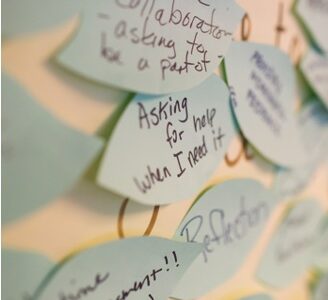Click here to listen to this week’s JAM – New Rules For Success.
A small team of Hillbrook leaders, including our US Head, College Counselor, Director of Teaching & Learning, and Director of the Scott Center, spent the last few days at the Mastery Transcript Consortium Symposium in San Diego. The MTC was founded in 2016 by Scott Looney, the Head of Hawken School in Cleveland, Ohio, with the goal of better preparing students for the world of today and tomorrow by challenging the traditional forms of grading and the structure of the traditional transcript for applying to colleges. As Scott noted during the conference, the current systems – grounded in the early 20th Century factory model of schooling – were designed to rank and sort students, not encourage growth and learning. The current systems alienate vast numbers of students from their own learning journey. Even students who do well in school, often see it as little more than a game. They are simply “doing school” until they can escape and do something meaningful in the real world. Competency-based systems turn this on its head, placing student engagement at the center of the assessment process.
We were drawn to the MTC, which has more than 400 schools across 38 countries, because we agree that our assessment system should be developed around a competency-based learning model. While we expect to continue having grades on our transcripts, the foundation of that system will be an emphasis on tracking student learning and growth against a set of schoolwide competencies.
A few key takeaways from the symposium:
- The newly released MTC Mastery Learning Report will allow students to track their own growth versus their school’s established competencies and have a powerful and compelling way to share their own unique learning journey and strengths with colleges. It will be a game-changer for student academic progress and growth AND for their college admission process.
- Colleges value what the MTC and competency-based systems do – help students understand themselves as learners and share that with the schools to which they are applying. USC VP for Enrollment Management Kedra Ishop shared that Higher Ed is having the same conversations about learning at their institutions, while Associate Director of Admission Jim Bonner at USD noted that the things emphasized by a learner-focused competency-based assessment system are the things college wants in their student body – students who are changemakers with a commitment to social justice, students who develop global perspectives and critical thinking skills, and students who are deeply engaged in their own learning.
- There is a growing mental health crisis for our students, particularly in high school and college. What is at the root of that crisis? According to a study by Challenge Success, the main culprit is the school system, including the traditional emphasis on homework, rote learning, cramming for tests, and the pressure to get into college. As USC VP for Enrollment Management Ishop noted, “we see the anxiety on our campus created by the anxiety we have created through the system.” She added that they can’t hire enough counselors to meet the needs they have right now. What is one way to help address this crisis? Increase student engagement, the thing that is at the heart of a competency-based learning system.
A final note – one of the most inspiring examples I heard about during the two days was from Miss Porter’s School, one of the oldest all-girls Boarding Schools in the country. Multiple members of the Miss Porter’s team described the work they have been doing to shift to a competency-based system, the positive response they are receiving from their students, and the continuing strength of their students in the college admission process. Their point? This shift, which prioritizes growth and learning, is both good for students and helpful for the college admission process. We are excited to continue designing our own competency-based system in the months ahead.

